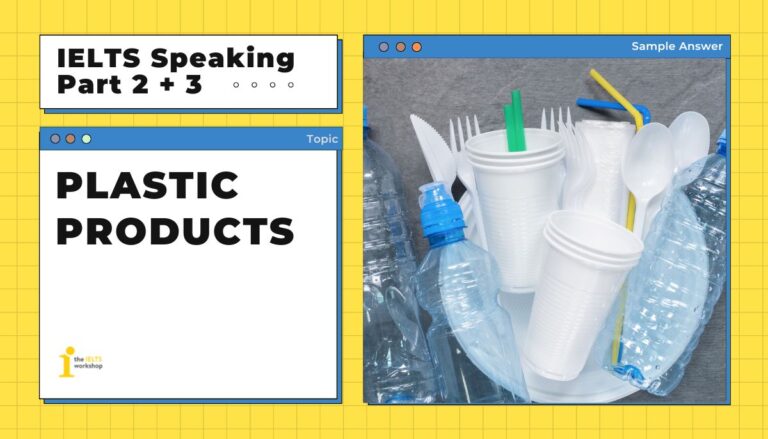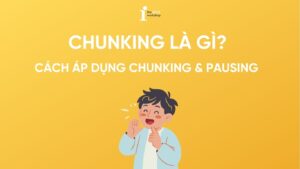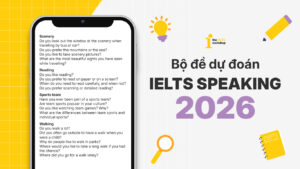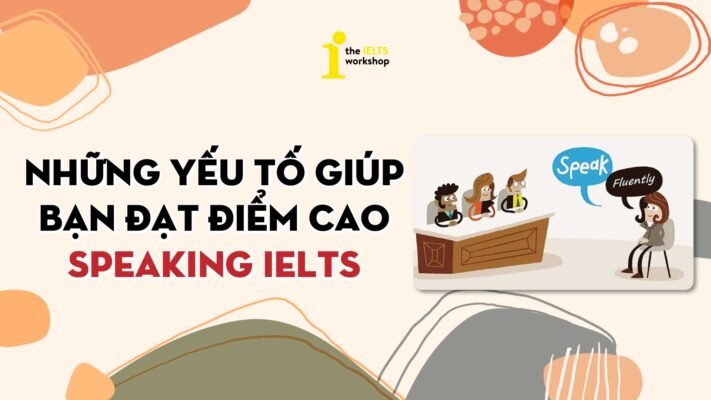Tại bài giải mẫu IELTS Speaking lần này, cô Mai Linh của The IELTS Workshop HN sẽ hướng dẫn bạn trả lời một số câu hỏi của chủ đề Plastic Products trong IELTS Speaking Part 2 & 3. Cùng tham khảo sample, từ vựng và một vài cách diễn đạt ghi điểm trong phần thi IELTS Speaking nhé.
Part 2: Describe a time when you saw a lot of plastic waste (e.g. in a park, on the beach, etc.)
Describe a time when you saw a lot of plastic waste (e.g. in a park, on the beach, etc.)
You should say:
Where and when you saw the plastic waste
Why there were a lot of plastic waste
What you did after you saw them
And explain what your thoughts were about this
Dưới đây là bài mẫu cho topic “Describe a time when you saw a lot of plastic waste“.
1. Bài mẫu (Sample Answer)
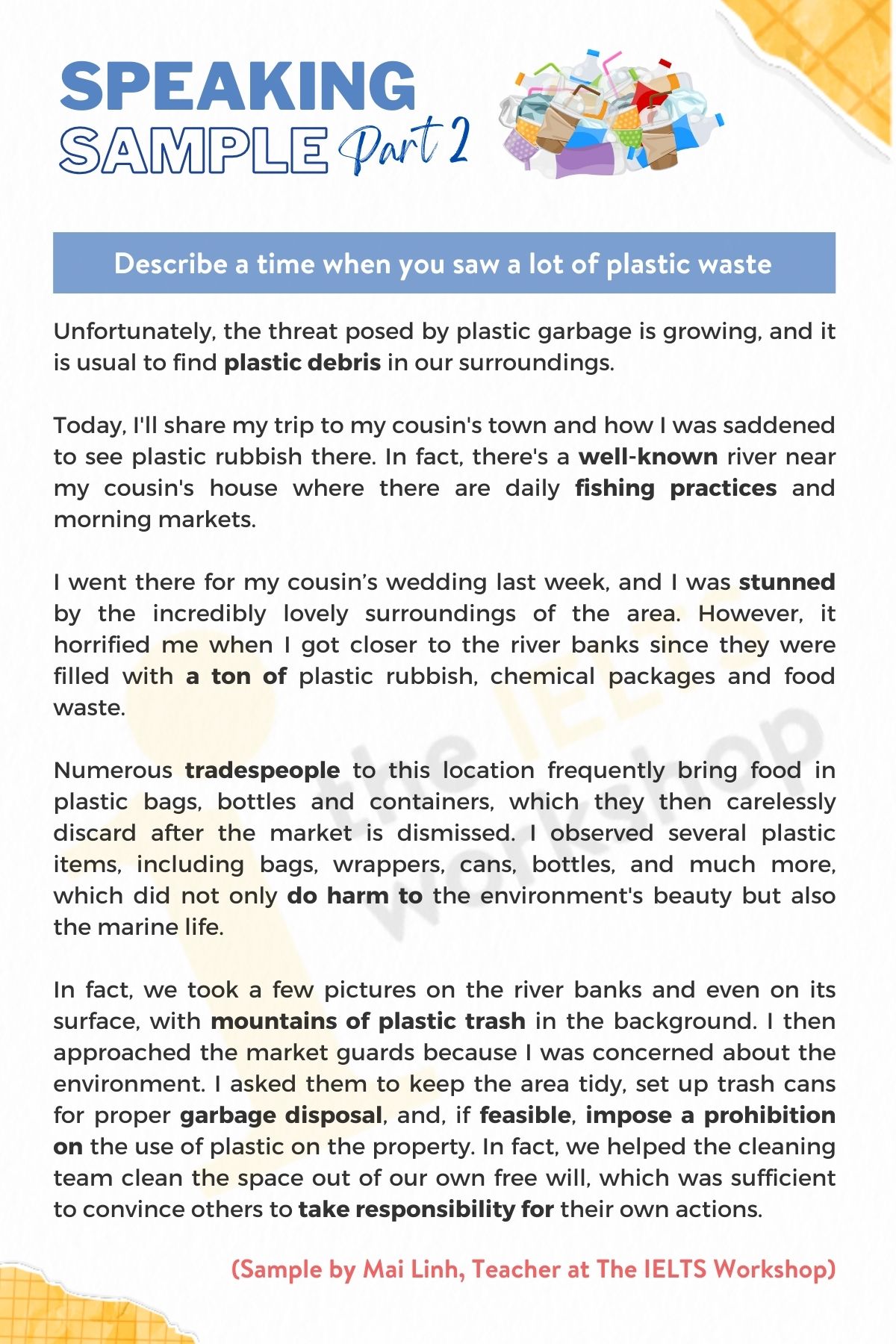
2. Từ vựng (Vocabulary Highlight)
- plastic debris: mảnh vụn nhựa
- well-known: nổi tiếng
- fishing practices: tập quán đánh cá
- stunned: choáng ngợp
- a ton of: một tấn, một đống
- tradespeople: thương gia
- do harm to: làm hại
- mountains of plastic trash: núi rác nhựa
- garbage disposal: xử lý rác thải
- feasible: khả thi
- impose a prohibition on: áp đặt lệnh cấm đối với
- take responsibility for: chịu trách nhiệm về
Part 3: Plastic Products
Bên cạnh Part 2, bạn hãy tham khảo thêm Part 3 cho chủ đề này nhé
1. Do you think we should use plastic products?
2. How can we reduce our use of plastic?
3. What kinds of plastic waste are often seen in your country?
4. Why do people like to use plastic products?

1. Do you think we should use plastic products?
Absolutely not, as using plastic bags in stores and supermarkets has a detrimental impact on the environment. They take several years to degrade once they are released into the environment. They remain intact and become trash in our cities and oceans. Plastic bags will end up in the growing number of landfills and cause soil degradation if they are put in the garbage. In cities, they choke drains and eventually make their way to the sea, where they entangle marine life. Those that are simply thrown in the street do the same. Secondly, entanglement or malnutrition are the main causes of animal deaths. Every year, plastic kills millions of animals, including fish, birds, and other marine life. This is due to the possibility that they mistakenly swallow plastic as food; yet, their bodies are unable to digest it. On the other hand, some may take in plastic products and absorb the toxic substances in it. There are around 700 species known to have been impacted by plastics, including several endangered ones.
- detrimental: bất lợi
- degrade: xuống cấp
- remain intact: vẫn còn nguyên vẹn
- landfills: bãi rác
- soil degradation: thoái hóa đất
- make their way to: tìm đường đến
- entangle: vướng víu
- malnutrition: suy dinh dưỡng
- mistakenly swallow: nuốt nhầm
2. How can we reduce our use of plastic?
We may have a variety of practical approaches from which to pick. First of all, we need to stay away from single-use plastics like drinking straws. This is because single-use plastics, such as plates and cutlery made of them, simplify our lives while gravely harming the environment. There is a pressing necessity to select these types of products above their potential alternatives. Second, when we go shopping, we can use a cloth bag rather than a plastic one. To stock our refrigerators, we might need to visit the grocery store at least once every week. The condition of our earth will improve if we use reusable bags (made of fabric, string, or wicker) each time we leave the house. From now on, I will always take these bags with me when I leave the house.
- practical approaches: cách tiếp cận thực tế
- single-use plastics: nhựa dùng một lần
- cutlery: dao kéo
- gravely harming: gây hại nghiêm trọng
- potential alternatives: lựa chọn thay thế tiềm năng
- reusable: tái sử dụng
3. What kinds of plastic waste are often seen in your country?
I mostly see food wrappers, plastic bottles, plastic bottle caps, plastic grocery bags, plastic straws, and stirrers as the most common items. These single-use plastic products are everywhere. For many of us, they have become an integral part of our daily lives. Many of the people use these products every day because they are readily available and cheap. They don’t even think about where plastic products might end up. That’s why plastic items are scattered everywhere on the street, on the water surface and in the soil. Our government has not imposed any restrictions or punishments on poor treatments of plastics so this has still been an alarming situation for the past decades.
- stirrers: máy khuấy
- single-use plastic: nhựa dùng một lần
- an integral part: một phần không thể thiếu
- end up: kết thúc
- imposed any restrictions: áp đặt bất kỳ hạn chế
- punishments: hình phạt
4. Why do people like to use plastic products?
Two basic causes could be to blame for this. To start with, plastic lessens food waste. Food waste is decreased and made to last longer thanks to plastic packing. As the world’s population rises, it is essential to maximize the resources available for food production. The amount of food wasted in transit from the field to the table must be kept to a minimum by the use of carefully thought-out packaging. Plastic also lowers CO2 emissions. More liquid can be transported in plastic bottles than glass bottles for the same transit weight. As a result, there are fewer transports, which means less energy is used, less carbon dioxide is emitted, and less money is spent on transportation.
- plastic packing: bao bì nhựa
- maximize: tối đa hóa
- transit: quá cảnh
- kept to a minimum: giữ ở mức tối thiểu
- thought-out packaging: bao bì chu đáo
- plastic bottles: chai nhựa
Bài mẫu bởi cô Mai Linh – Giáo viên The IELTS Workshop HN
Trên đây là những nội dung bạn có thể tham khảo khi luyện tập chủ đề Plastic Products trong IELTS Speaking Part 2 và Part 3.
Nếu bạn đang gặp khó khăn trong xây dựng câu trả lời cho phần thi IELTS Speaking Part 3, hãy tham khảo ngay phương pháp học tại khóa Senior của The IELTS Workshop.


